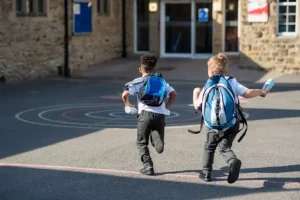The government recently launched new measures to help tackle widespread school absences.
 Launched as pupils were due to head back into the classroom following their Christmas break, the new measures are designed to drive up attendance and tackle persistent absences at schools in England.
Launched as pupils were due to head back into the classroom following their Christmas break, the new measures are designed to drive up attendance and tackle persistent absences at schools in England.
Figures show that the number of pupils frequently absent from school has roughly doubled since the Covid-19 pandemic, with 140,000 pupils being classed as “severely absent” in 2023.
More hubs to reduce school absences
Among the measures being introduced to tackle school absences was a major expansion of attendance hubs, which deliver tailored support to families and pupils to help increase time spent in school.
 The government says that the number of these hubs will more than double – from 14 to 32 – to support 1,000 additional schools and ensure that over a million children and young people are supported into regular education.
The government says that the number of these hubs will more than double – from 14 to 32 – to support 1,000 additional schools and ensure that over a million children and young people are supported into regular education.
The 18 new attendance hubs will be placed across 6 different regions and will ensure that, in total, the hubs can support almost 2,000 schools.
Attendance hubs are run by lead schools which have excellent attendance. They share practical tips and advice with other primary, secondary, alternative provision and special schools in England who need help to boost attendance levels.
Support to reduce school absences can include direct pupil engagement initiatives, such as breakfast clubs and extracurricular activities, to improvements to processes and analysis of attendance data.
Direct support for persistent school absences
The government is also increasing the direct support it provides to children and their families to tackle persistent and severe school absences.
From September 2024, the attendance mentor pilot programme, currently being run with Barnardo’s, will also expand, with trained attendance mentors working in 10 additional areas. This expansion will see the government invest £15 million over 3 years to ensure that direct intensive support can be provided to more than 10,000 persistent and severely absent pupils and their families.
 The programme, which is already operating in Middlesbrough, Doncaster, Knowsley, Salford and Stoke-on-Trent, delivers intensive one-to-one support to pupils who are persistently absent from school, working with their families to identify the root causes. This can then lead to the provision of extra support, more intensive work with teachers or, in some cases, bridge-building between the school and family.
The programme, which is already operating in Middlesbrough, Doncaster, Knowsley, Salford and Stoke-on-Trent, delivers intensive one-to-one support to pupils who are persistently absent from school, working with their families to identify the root causes. This can then lead to the provision of extra support, more intensive work with teachers or, in some cases, bridge-building between the school and family.
The Chief Executive of Barnardo’s, Lynn Perry MBE, said the scheme had shown “that one of the best ways to improve attendance is working individually with children, building trust and listening to their concerns.”
She explained that the attendance mentors “encourage children to talk openly about issues such as family finances, bullying, or mental health worries – anything they feel may be preventing them from going to school.
Guidance for school absences and illness
The government has also launched a national communications campaign to highlight the importance of attending school.
 Seeking to influence parent and carers’ views on the importance of school attendance and the value of a school day, the campaign will be shared across social media channels, with paid social media advertising and partnerships with influencers, and through media partnerships and radio advertising.
Seeking to influence parent and carers’ views on the importance of school attendance and the value of a school day, the campaign will be shared across social media channels, with paid social media advertising and partnerships with influencers, and through media partnerships and radio advertising.
The Moments Matter, Attendance Counts toolkit for schools explains how attendance is linked to pupil attainment, wellbeing and development. It also provides signposting to further advice and support.
The advice refers to a letter from the Chief Medical Officer and leading health professionals, published in September last year, which talks about mild illness, attendance and key information for parents about when to send their child to school or keep them home. It highlights the fact that a prolonged period of absence is likely to heighten a child’s anxiety about attending school in the future.
Tackling school absences is the ‘number one priority’
The government has also set its intention to introduce new legislation that will require all schools to share their daily school registers.
 They plan to reform pupil registration practice and hope that this and the new legislation will help to modernise how schools record and share attendance data and support them to understand what is driving school absences among their pupils.
They plan to reform pupil registration practice and hope that this and the new legislation will help to modernise how schools record and share attendance data and support them to understand what is driving school absences among their pupils.
The key aim is to provide early support and intervention when pupils are displaying worrying trends of absence.
Announcing the new stronger measures, the Education Secretary Gillian Keegan said that tackling school absences was her “number one priority.”
She added:
“We want all our children to have the best start in life because we know that attending school is vital to a child’s wellbeing, development, and attainment as well as impact future career success.
“I am hugely grateful to all our brilliant teachers, heads and everyone whose [sic] worked with us to make the progress we’ve already made with 380,000 fewer children persistently absent.”
Children’s Commissioner Rachel De Souza said tackling school absences was also one of her “top priorities” and added:
“Every day counts: when children miss school, it’s not just about missing lessons, it’s also about losing valuable moments spent with their friends and teachers.
“I very much welcome the government’s announcements today which include the recommendations made last year in my report on school attendance.
“I am hopeful that these measures will arm local authorities and schools with real-time information about school absence rates and provide vital support for children who face barriers to attending school.”
Why are so many children absent from school?
 Back in 2019 and earlier, overall school absences remained around the 4.5% mark, but in the 2022-23 academic year, they soared to 7.5%. Secondary schools are particularly affected, with 88,000 secondary school students missing at least half of their education last year.
Back in 2019 and earlier, overall school absences remained around the 4.5% mark, but in the 2022-23 academic year, they soared to 7.5%. Secondary schools are particularly affected, with 88,000 secondary school students missing at least half of their education last year.
The 140,000 children classed as “severely absent” from school last year represents an increase of 134% since before the pandemic. This figure includes children who were absent due to illness or mental health problems.
In addition, a record 350,000 parents were fined by schools in England last year after they took their children out of class for unauthorised term-time holidays.
This has led to concerns that there has been a breakdown in the relationship between schools and families, with parental attitudes towards the importance of school, absences and behaviour having shifted since the prolonged closure of schools during lockdown.
In fact, a recent YouGov poll conducted for the Centre for Social Justice (CSJ) thinktank found that almost 1 in 3 parents (28%) believe the Covid-19 pandemic showed that it is not essential for children to attend school every day.
The report, entitled ‘The Missing Link: Restoring the bond between schools and families’ questioned 1,206 parents during December 2023 and also found only 70% were confident that their child’s needs were being met at school. This dropped to 61% for parents of secondary school-aged children.
Geoff Barton, the General Secretary of the Association of School and College Leaders agreed that the rise in unauthorised holidays could be due to parents regarding school attendance as “flexible” following the pandemic, but suggested they could also be more conscious of saving money amid the ongoing cost-of-living crisis.

Headteachers and Ofsted have also warned of increased “friction” with parents since lockdown.
Staff redundancies, a lack of funding for schools, the cost-of-living crisis, a rise in mental health problems among children and an increase in parents working from home have all also been linked to soaring school absences.
Meanwhile, the CSJ said that post-pandemic strike action “will have done little to rectify perceptions of school as optional,” citing the fact that 25 million school days were lost to industrial action during the 2022-23 academic year.
A spokesperson from the Department for Education said:
“Parents have a duty to make sure their child regularly attends school, and holidays should be around school breaks to avoid taking children out of school during term time. Our guidance is based on a support-first ethos; however, we support schools and local authorities to use punitive measures such as fines where it is deemed appropriate.”
But CSJ Chief Executive, Andy Cook, cautioned that it was “not a one-way street.”
He explained:
“Parents have legitimate expectations of schools which government must help them to deliver, but as parents, we need to take responsibility for getting our kids ready for school, at school, and for keeping them engaged in school.
“Restoring the bond between parents and schools – supported by small charities and community organisations – will help us to do this.
“Failure to address this will be catastrophic for the future of our people, communities and state.”
School absences a “generational challenge”
Labour has described the issue of rising school absences as a “generational challenge.”
 Noting that the 140,000 children severely absent from school last year included those who were absent due to illness or mental health problems, Labour has pledged to introduce more mental health counsellors in secondary schools if they get into power.
Noting that the 140,000 children severely absent from school last year included those who were absent due to illness or mental health problems, Labour has pledged to introduce more mental health counsellors in secondary schools if they get into power.
They want to introduce mental health hubs in every community and offer universal free breakfast clubs for every primary school pupil to help boost attendance.
Shadow Education Secretary Bridget Phillipson said the “broken relationship between schools and families” needed to be mended but that the government’s new measures only equated to “tinkering around the edges of a generational challenge.”
She said that Labour had a long-term plan to tackle the school absences crisis.
During an appearance on Sunday with Laura Kuenssberg on BBC1 recently, she said:
“The challenge that we’re seeing at the moment around persistent absenteeism means that 1 in 5 children are regularly out of school. That figure is set to rise to 1 in 4. That is a staggering number of children.
“It’s damaging their life chances and it’s damaging the life chances of all of the children within the school community too.”
Meanwhile, in their report, the CSJ set out a seven-point plan to mend the bond between school and families. According to Mr Cook, this centres around “parental engagement and whole family support.” It includes:
- A minimum of 5 hours of extracurricular activities each week via a “right to sport”
- Investment in youth clubs and services
- Mental health support
- The rollout of attendance mentors
- Reviewing the effectiveness of fines and prosecutions for pupil absences
- Creation of a National Parental Participation Strategy
Training to support schools and pupils
 First Response Training (FRT) is a leading national training provider delivering courses in subjects such as health and safety, first aid, fire safety, manual handling, food safety, mental health, health and social care, safeguarding and more.
First Response Training (FRT) is a leading national training provider delivering courses in subjects such as health and safety, first aid, fire safety, manual handling, food safety, mental health, health and social care, safeguarding and more.
They work with a large number of primary and secondary schools as well as early years and childcare providers, colleges, universities and children’s services.
Their courses include Health and Safety for Child Carers and Safeguarding of Children in Education.
They also deliver a range of training to help people support mental health and wellbeing and identify when individuals may be experiencing emotional and mental distress. These include Understanding Mental Health, Youth Mental Health First Aid, Anxiety Awareness, Self-Harm Awareness and Suicide Awareness.
A trainer from FRT says:
“In September 2023, figures were published which revealed that more than 1.7 million children were persistently absent from school in 2021-22. This means that they missed 10% or more of school time.
“The current school absences crisis has been building for a while and, in Autumn 2022, Ofsted said that nearly a quarter of all pupils in England were classed as persistently absent.
“It is clear that robust and effective measures are needed to rectify the problem, build back trust between parents and schools and ensure that children are supported to attend school and do not suffer.
“We hope that the new measures introduced by the government boost school attendance and make a positive change. Proper training and support to help staff identify and address mental health problems, safeguarding issues and other difficulties can also help ensure that more children are given early help and support and feel able and willing to attend school.”
A brief summary of our mental health training can now be downloaded as an infographic.
You can also download our free Guide to Mental Health Training from our website.
For more information on the training that FRT can provide, please call them today on freephone 0800 310 2300 or send an e-mail to info@firstresponsetraining.com.
